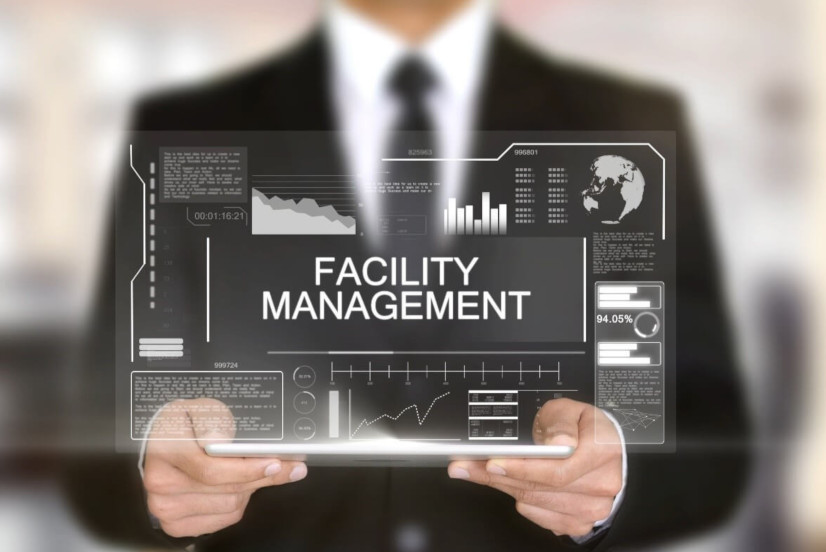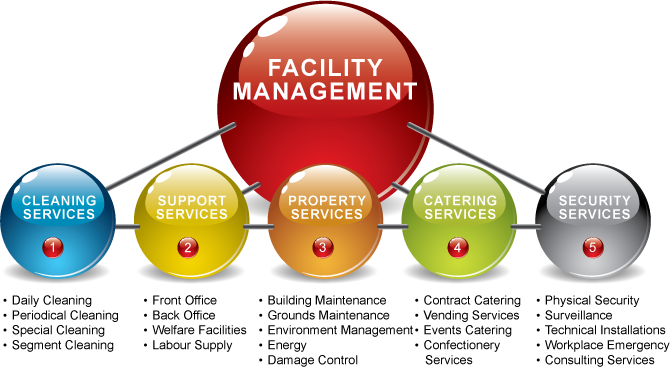Why Facility Management is Critical for Property Durability
Why Facility Management is Critical for Property Durability
Blog Article
Trick Fads Shaping the Future of Center Management in 2024
As we look ahead to 2024, the landscape of center administration is poised for significant makeover, driven by a number of key fads. The integration of clever structure innovations and a shift in the direction of data-driven decision-making guarantee to boost operational efficiency while prioritizing sustainability in method.
Smart Building Technologies

Smart structure innovations include a wide variety of systems, including smart lights, heating and cooling controls, and protection systems. By incorporating these systems, facility supervisors can keep an eye on and change specifications in real-time, leading to substantial reductions in energy waste and operational costs. For instance, smart sensors can identify occupancy levels and adjust illumination and temperature level accordingly, making certain that energy is only used when essential.
Additionally, these technologies assist in boosted data collection, enabling organizations to track usage patterns and recognize possibilities for more renovations. The execution of wise structure technologies not only contributes to sustainability goals but additionally produces healthier work atmospheres that can enhance employee productivity and contentment.
As we relocate into 2024, the adoption of wise structure modern technologies will likely accelerate, mirroring a broader change in the direction of even more smart, receptive, and lasting center administration practices.
Data-Driven Decision Making
Significantly, companies are leveraging data-driven decision making to improve facility management practices. By harnessing information analytics, facility managers can derive actionable understandings that dramatically enhance functional efficiency and source allocation. The assimilation of advanced innovations, such as IoT sensing units and real-time monitoring systems, makes it possible for the collection of vast amounts of information on building performance, tenancy prices, and energy usage.
This wide range of information enables center supervisors to identify patterns, forecast upkeep needs, and proactively address problems prior to they rise. As an example, predictive analytics can anticipate tools failures, decreasing downtime and fixing costs. Additionally, data visualization devices promote far better interaction among stakeholders, ensuring that notified decisions are made collaboratively.
Furthermore, data-driven approaches boost calculated planning by making it possible for facility managers to assess the effectiveness of present practices and make educated options regarding investments in innovation or framework. As organizations significantly focus on functional quality, data-driven decision making is poised to become a cornerstone of successful center monitoring strategies in 2024 and past. Inevitably, the ability to utilize data properly will empower organizations to create more efficient, effective, and durable facilities.
Sustainability and Green Practices
The focus on data-driven choice making naturally lines up with the expanding concentrate on click this link sustainability and green practices within center monitoring. As organizations progressively prioritize ecological duty, facility supervisors are leveraging analytics to maximize source use, decrease waste, and minimize carbon impacts. This tactical strategy enables the combination of energy-efficient systems, such as LED illumination, wise a/c controls, and renewable resource resources right into center procedures.
Moreover, the execution of sustainable techniques prolongs past power consumption. Center supervisors are taking on environmentally friendly materials and promoting reusing efforts to produce a round economy within their centers. This not just enhances the ecological account of the organization yet also promotes a society of sustainability amongst staff members.
Conformity with ecological policies is an additional crucial aspect driving the fostering of environment-friendly practices. By using information analytics, center managers can keep track of compliance metrics and recognize areas for renovation, guaranteeing adherence to neighborhood and worldwide sustainability requirements.
Hybrid Job Models
A substantial change towards crossbreed work designs is reshaping the landscape of facility administration in 2024. This paradigm incorporates remote and in-office job, demanding a reevaluation of room usage, source allocation, and staff member interaction techniques. Organizations are significantly recognizing the importance of versatile workspaces that accommodate varied needs and choices.
Facility supervisors have to adjust by executing versatile workplace layouts that support collective efforts while providing locations for focused job. This includes the combination of technology to help with seamless communication and partnership amongst remote and in-office workers. Smart building solutions, furnished with sensors and analytics, allow for real-time monitoring of space use, making it possible for companies to optimize their environments successfully.
Furthermore, crossbreed work versions highlight the demand for reliable center monitoring that focuses on worker experience. In essence, the hybrid work model is revolutionizing facility administration, encouraging a proactive strategy to fulfill the progressing demands of the workforce.
Enhanced Owner Wellness
As companies welcome hybrid work designs, an increased focus on owner health is becoming integral to center administration methods. Facility Management. This shift recognizes that a pleased and healthy labor force directly influences efficiency and retention rates. Center managers are currently prioritizing environments that advertise physical and psychological wellness, integrating components such as all-natural lighting, biophilic design, and available have a peek at these guys wellness sources

Modern technology plays a crucial role in this advancement. Smart structure systems can check ecological variables and readjust setups in real-time, making sure ideal comfort levels - Facility Management. Furthermore, responses systems, such as occupancy sensors and employee studies, enable facility managers to continually improve wellness initiatives based on occupant demands.

Final Thought
In 2024, the future of center management will certainly be dramatically influenced by the combination of clever structure technologies and data-driven decision-making, promoting improved functional efficiency. Sustainability initiatives will certainly focus on environmentally friendly techniques, while the emergence of hybrid job versions will certainly necessitate versatile workplace layouts. Furthermore, an increased concentrate on resident health via innovative a/c systems and biophilic design will add to healthier click here for more info workplace. These trends jointly emphasize the progressing landscape of facility management in response to modern difficulties and possibilities.
Center managers are advertising and taking on environment-friendly materials recycling campaigns to produce a circular economic situation within their facilities.A substantial shift in the direction of crossbreed work versions is reshaping the landscape of center management in 2024.Additionally, hybrid work versions highlight the requirement for effective facility monitoring that focuses on employee experience.As companies accept hybrid job designs, a heightened focus on owner wellness is ending up being integral to center administration approaches.In 2024, the future of center management will certainly be dramatically influenced by the assimilation of wise building innovations and data-driven decision-making, cultivating improved operational performance.
Report this page